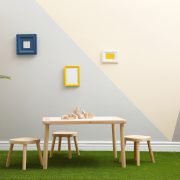When considering implementing waterfall landscape ideas, you must be certain of several factors.
Likewise, if you are in a tight, decisive spot, similar to Shakespeare’s Hamlet – “to have a waterfall edge or not,” understanding the pros and cons of investing is crucial.
The waterfall edge is suddenly grabbing attention and is a trend quickly making its way from consoles and coffee tables to your home kitchens.
The waterfall-edge countertop has been a popular home and kitchen decor trend for the last three to four decades.
So, if you want to understand more about investing in a waterfall edge, continue reading this blog.
What is a Waterfall-Edge Kitchen Countertop?

It first appeared in the public eye during the Art Deco movement, came back in trend in the 1970s and 1980s, and is currently hitting its stride again.
But earlier, the edges would be rounder, and now all the lines meet the edge at sharp right angles.
These edges come with simple and clean lines, offering a modern touch of aesthetics.
The waterfall edge is where the countertop material or the material from the cabinet flows down from the top through the side down to the floor.
This design prospect makes it appear like a waterfall. The waterfall countertop design is common with kitchen islands as it dramatically affects the room.
It also shows off the countertop material and is an excellent way to make the kitchen island a focal point in the room.
Merits and Demerits: Incorporating a Waterfall Edge

To decide whether a waterfall edge design is worth investing in, you have to know the merits and demerits.
Pros of a Waterfall Edge
1. Breathtaking Beauty
Once incorporated into your kitchen island, it becomes the center of attraction, and nobody can take their eyes off it. It certainly reflects class and contemporary aesthetics.
2. Durability
If your waterfall-edge countertop is made of quartz, it could last 2 to 3 decades without needing repairs and renovation, as quartz is quite a resilient material. Stone also protects the cabinets from regular wear and tear.
3. Ease of Cleanliness
As waterfall countertops are stone and quartz, they offer easier cleaning than wood and other kitchen countertop materials. You can clean it with a moist cloth.
Cons of a Waterfall Edge
1. Expensive
Because of the skilled craftsmanship required, you cannot avoid bearing the high cost of incorporating the waterfall edge countertop in your kitchen island.
The estimated cost of the CNC fabrication process alone, in addition to the materials, is around $2,000.
2. Theme-Based Design
A waterfall edge countertop is a theme-specific design that doesn’t match every theme.
It mostly suits contemporary designs and goes well with such interiors instead of traditional or rustic interior decor.
It is also a little less flexible, especially if you want to add an outlet.
Choice of Materials for Waterfall Edge Countertops

Normally, waterfall edge countertops could be made of natural wood or stone.
However, wood, marble, and granite don’t do well as waterfall edge countertop design materials as they contain natural veining.
Mismatched veining will fail to create that cascading effect. Therefore, quartz has become the next material for interior designers.
It is easy to match the veining, or it is also possible to exclude it completely to make it appear as one cohesive material.
Designers also love to mix quartz with resins and pigments to increase the versatility of the design. The slabs are 2 to 3 inches thick on the sides and top.
However, all the slabs should be uniform in thickness, while the overhang can be between 10.5 and 18 inches.
Cost of Installing a Waterfall Edge Countertop

Here is a breakdown of the cost of installing a waterfall countertop.
Stone quartz costs around $100 per square foot, and another $100 per square foot goes into installation.
You must keep aside an additional $2,000 for the CNC fabrication process.
Manufacturers will use computer numerical control laser cutters to precisely cut the slab, which helps produce metered edges that will fit together perfectly.
Furthermore, if you use granite countertops, you must spend an additional $200 to $1,200 twice a year on resealing.
Different Ideas to Incorporate Waterfall Edge Countertops

You can use the tips below to install a waterfall edge countertop.
- Use quartz to create patterns.
- Stick to minimalist designs.
- Remember to create a seamless look by matching the kitchen countertop with other kitchen surfaces.
- You can create a bold statement with wood chairs when choosing seating options.
In Conclusion
So, here’s what you need to understand about implementing waterfall-edge kitchen countertops and cabinets.
This blog gave you an estimate of the money you’ll need to spend on installing this design.
Certainly, installing the quartz waterfall edge kitchen countertop will easily last you two decades without the need to repair or renovate your kitchen.
The design trend will also easily last and protect your cabinetry and appliances.
You can also hire an expert fabricator to create a proper waterfall edge.














Comments